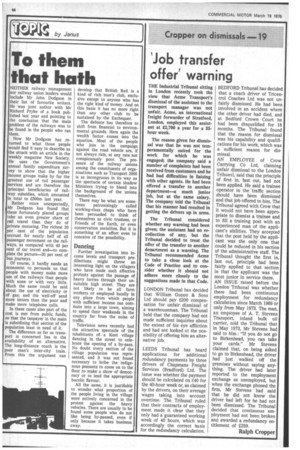To them that hath
Page 46

If you've noticed an error in this article please click here to report it so we can fix it.
NEITHER railway management nor railway union leaders would include Mr John Dodgson in their list of favourite writers. He was joint author with Mr Richard Pryke of a book published last year and pointing to the conclusion that the main problem of the railways was to be found in the people who ran them.
Now Mr Dodgson has returned to what those people would find it easy to describe as the attack with an article in the weekly magazine New Society. He uses the Government's annual family expenditure survey to show that the higher income groups make by far the greatest use of rail passenger services and are therefore the principal beneficiaries of railway subsidies, which amounted in total to £500m last year.
Rather more unexpectedly, Mr Dodgson has found that these fortunately placed groups take an even greater share of rail travel than they do of private motoring. The richest 20 per cent of the population account for nearly half of all passenger movement on the railways, as compared with 40 per cent of car travel and—to complete the picture-20 per cent of bus journeys.
Of course, it hardly needs an economist to persuade us that people with money make more use of the railways than people with none or with very little. Much the same could be said about the use of electricity or of gas; and the well-off send more letters than the poor and make more telephone calls.
In these cases also part of the cost is met from public funds, so that the taxpayer in the main is subsidising that section of the population least in need of it.
The difference as far as transport is concerned lies in the availability of an alternative. The long-distance coach is the poor man's inter-city train. From this the argument can develop that British Rail is a kind of rich man's club, exclusive except to anyone who has the right kind of money. And on this basis it has no more right than any other club to be sustained by the Exchequer.
The defence has therefore to shift from financial to environmental grounds. Here again the wealth factor comes into the equation. Most of the people who join in the campaign against the road vehicle are, if not always rich, at any rate not conspicuously poor. The presence of the railway unions among the constituents of organisations such as Transport 2000 is as incongruous in its way as the spectacle of certain shadow Ministers trying to blend into the background of the unions themselves.
There may be what are some times patronisingly called working-class chaps who have been persuaded to think of themselves as civic trustees, or Friends of the Earth, or even conservation socialites. But it is something of an effort even to conceive of the possibility.
Dancing
Further investigation into income levels and transport predilections might throw an interesting light on the villagers who have made such effective protests against the passage of heavy lorries through their unsuitable high street. They are not likely to be all farm workers or employed locally in any place from which people with sufficient income can commute into a large town, aiming to spend their weekends in the country far from the noise of traffic.
Television news recently had the attractive spectacle of the inhabitants of a Kent village dancing in the street to celebrate the opening of a by-pass. No doubt every section of the village population was represented, and it was not found necessary to bribe the indigenous peasants to come on to the floor to make a show of democracy or to lend the appropriate bucolic flavour.
All the same, it is justifiable to wonder what proportion of the people living in the village were actively concerned in the protest against the heavy vehicles. There are usually to be found some people who do not like being by-passed, even if only because it takes business away.








































































































